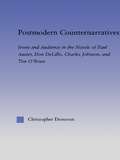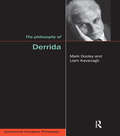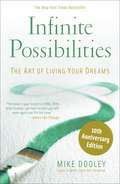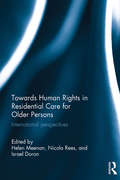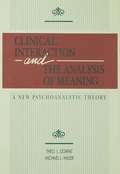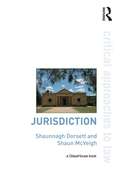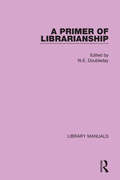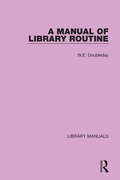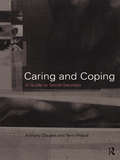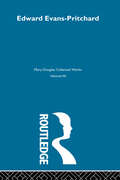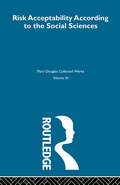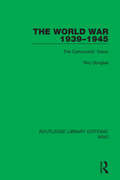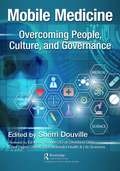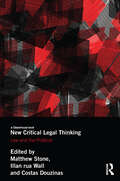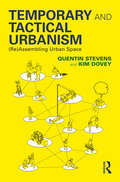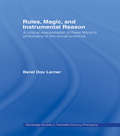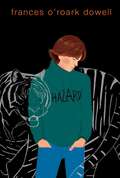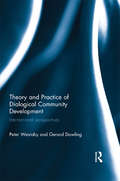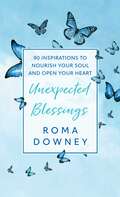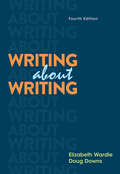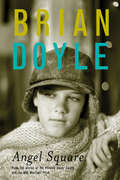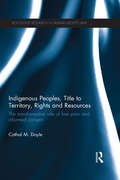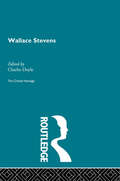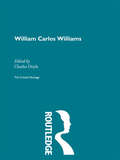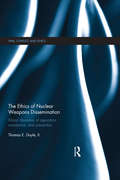Special Collections
Benetech’s Global Certified Accessible Titles
Description: Benetech’s GCA program is the first independent third-party EPUB certification to verify ebook accessibility. By creating content that is born accessible, publishers can meet the needs of all readers. Learn more: https://bornaccessible.benetech.org/
- Table View
- List View
Postmodern Counternarratives
by Christopher DonovanThis book provides a wide-ranging discussion of realism, postmodernism, literary theory and popular fiction before focusing on the careers of four prominent novelists. Despite wildly contrasting ambitions and agendas, all four grow progressively more sympathetic to the expectations of a mainstream literary audience, noting the increasingly neglected yet archetypal need for strong explanatory narrative even while remaining wary of its limitations, presumptions, and potential abuses. Exploring novels that manage to bridge the gap between accessible storytelling and literary theory, this book shows how contemporary authors reconcile values of posmodern literary experimentation and traditional realism.
The Philosophy of Derrida
by Mark Dooley and Liam KavanaghFor more than forty years Jacques Derrida has attempted to unsettle and disturb the presumptions underlying many of our most fundamental philosophical, political, and ethical conventions. In The Philosophy of Derrida, Mark Dooley examines Derrida's large body of work to provide an overview of his core philosophical ideas and a balanced appraisal of their lasting impact. One of the author's primary aims is to make accessible Derrida's writings by discussing them in a vernacular that renders them less opaque and nebulous. Derrida's unusual writing style, which mixes literary and philosophical vocabularies, is shown to have hindered their interpretation and translation. Dooley situates Derrida squarely in the tradition of historicist, hermeneutic and linguistic thought, and Derrida's objectives and those of "deconstruction" are rendered considerably more convincing. While Derrida's works are ostensibly diverse, Dooley reveals an underlying cohesion to his writings. From his early work on Husserl, Hegel and de Saussure, to his most recent writings on justice, hospitality and cosmopolitanism, Derrida is shown to have been grappling with the vexed question of national, cultural and personal identity and asking to what extent the notion of a "pure" identity has any real efficacy. Viewed from this perspective Derrida appears less as a wanton iconoclast, for whom deconstruction equals destruction, but as a sincere and sensitive writer who encourages us to shed light on out historical constructions so as to reveal that there is much about ourselves that we do not know.
Infinite Possibilities
by Mike DooleyInfinite Possibilities is the masterwork from teacher, author, and featured speaker Mike Dooley. As the next step beyond his immensely popular Notes from the Universe trilogy, and his follow up, Choose them Wisely, this book contains even more enriching wisdom for living an abundant, joyous life.Mike Dooley knows that we create our own reality, our own fate, and our own luck. We're beings filled with infinite possibility--just ready to explore how powerful we truly are. Manifesting the magnificence of our dreams isn't about hard work, but rather about belief and expectation. These principles transcend belief, realizing the truth about our human nature. Your dreams are not accidental, nor inconsequential. And if someone were tell the truth about life, reality, and the powers we all possessed, would it be recognized? Our lives are full of adventures--and not exactly the sky-diving, mountain-climbing variety--but something better. Readers will laugh, applaud, and be inspired by Mike Dooley's wit and wisdom.
Towards Human Rights in Residential Care for Older Persons
by Helen Meenan and Nicola Rees and Israel DoronPeople are leading significantly longer lives than previous generations did, and the proportion of older people in the population is growing. Residential care for older people will become increasingly necessary as our society ages and, we will require more of it. At this moment in time, the rights of older people receive attention at international and regional levels, with the United Nations, the Organization of American States and the African Union exploring the possibility of establishing new conventions for the rights of older persons. This book explores the rights of older people and their quality of care once they are living in a care home, and considers how we can commence the journey towards a human rights framework to ensure decent and dignified care for older people. The book takes a comparative approach to present and future challenges facing the care home sector for older people in Africa (Kenya), the Arab world (Egypt), Australia, China, England, Israel, Japan and the USA. An international panel of experts have contributed chapters, identifying how their particular society cares for its older and oldest people, the extent to which demographic and economic change has placed their system under pressure and the role that residential elder care homes play in their culture. The book also explores the extent to which constitutional or other rights form a foundation to the regulatory and legislative structures to residential elder care and it examines the important concept of dignity. As a multi-regional study of the care of older person from a human rights perspective, this book will be of excellent use and interest, in particular to students and researchers of family and welfare law, long-term care, social policy, social work, human rights and elder law.
Clinical Interaction and the Analysis of Meaning
by Theo L. Dorpat and Michael L. MillerClinical Interaction and the Analysis of Meaning evinces a therapeutic vitality all too rare in works of theory. Rather than fleeing from the insights of other disciplines, Dorpat and Miller discover in recent research confirmation of the possibilities of psychoanalytic treatment. In Section I, "Critique of Classical Theory," Dorpat proposes a radical revision of the notion of primary process consonant with contemporary cognitive science. Such a revised conception not only enlarges our understanding of the analytic process; it also provides analysis with a conceptual language that can articulate meaningful connections with a growing body of empirical research about the development and nature of human cognition. In Section II, "Interactional Theory," Miller reverses the direction of inquiry. He begins with the literature on cognitive development and functioning, and proceeds to mine it for concepts relevant to the clinical process. He shows how a revised understanding of the operation of cognition and affect can impart new meaning to basic clinical concepts such as resistance, transference, and level of psychopathology. In Section III, "Applications and Exemplifications," Dorpat concludes this exemplary collaboration by exploring select topics from the standpoint of his and Miller's new psychoanalytic theory. At the heart of the authors' endeavor it "meaning analysis," a concept that integrates an up-to-date model of human information processing with the traditional goals of psychoanalysis. The patient approaches the clinical encounter, they argue, with cognitive-affective schemas that are the accumulatice product of his life experience to date; the manifold meanings ascribed to the clinical interaction must be understood as the product of these schemas rather than as distortions deriving from unconscious, drive-related fantasies. The therapist's goal is to make the patient's meaning-making conscious and thus available for introspection.
Jurisdiction
by Shaunnagh Dorsett and Shaun McVeighThis book takes its cue from the observation that jurisdiction - as the speech of law - articulates or proclaims law. Without jurisdiction the law would be speechless, without authority and authorisation. So too would be critics who approach the law or want to live lawfully. As a field of legal knowledge and legal practice, jurisdiction is concerned with the modes of authority and the manner of the authorisation of law. It encompasses the broadest questions of the authority and the founding of legal order as well as the minutest detail of the ordering of the business of the administration and adjudication of justice. It gives us both the point of articulation of law and the technological means of the expression of law. It gives us too, the understanding of the limits of the authority of law, as well as the resources for engaging with the plurality of laws, and the means of engaging in lawful behaviour. A critical approach to law through the forms of authority and action in law provides a means of engaging with the quality of relations created and maintained through law and a means of taking responsibility for the practices of jurisdiction (and what is done in the name of the law). This book provides a critical, and historically grounded, elaboration of the key themes of jurisdiction. It does so by offering students and scholars of law a form of critical engagement with the technologies, devices and forms of jurisdictional ordering. It shows how the common has authorised legal relations and bound persons, places, and events to the body of law. It offers a number of resources and engagements of jurisdiction on the basis that a jurisprudence of jurisdiction, if it is anything, engages forms of human relation.
A Primer of Librarianship
by W. E. DoubledayThis book, first published in 1931, presents a survey of librarianship by some of its leading theorists of the early twentieth century, a time of rapid library expansion following the Library Act of 1919. The entire field of Library service was undergoing review and experiment, with little remaining unchanged, and this volume details some of the new and modern practices then being adopted.
A Manual of Library Routine
by W.E. DoubledayThis book, first published in 1933, addresses the ‘routine’ in library work: administration, organization, book selection and classification and cataloguing, as well as the office work, room supervision, shelf tidying and registration of borrowers, among others.
Caring and Coping
by Anthony Douglas and Terry PhilpotCaring and Coping provides a clear and accessible explanation of the history, politics, management, funding and day-to-day work of the social services in Britain. Social Care now encompasses a wide range of increasingly specialised professions. Caring and Coping aims to improve the practitioner's (and the general public's) understanding not only of what these various professions do, but also what the legal, political, ethical and financial constraints are upon them. It succinctly addresses issues such as:* the terms and effects of the Children Act and the Community Care Act* the role of charities in the modern welfare state* the role of management* relationships with other agencies* and the place of social work within the community. Social services are so often portrayed in the media in a sensationalist way and this book counterbalances the hype by providing solid research and a more down-to-earth picture. It is an ideal introductory text for those training to be social workers.
Evans-Pritchard
by Mary DouglasFirst published in 1980, this book provides an overview of E. E. Evans-Pritchard's approach to anthropology. His seminal works on the Azande and the Nuer had an immense impact on the field in Britain. He wrote these works in his thirties and forties, after which time he became chair of anthropology at Oxford. His pupils and colleagues from his days as the head of Institute of Social Anthropology went from Oxford to complete the institutional establishment of social anthropology. In this book Douglas links the development of her own theories to her training under Evans-Pritchard at the institute and to the close friendship that they forged in the years after.
Risk and Acceptability
by Mary DouglasFirst published in 1985, Mary Douglas intended Risk and Acceptability as a review of the existing literature on the state of risk theory. Unsatisfied with the current studies of risk, which she found to be flawed by individualistic and psychologistic biases, she instead uses the book to argue risk analysis from an anthropological perspective. Douglas raises questions about rational choice, the provision of public good and the autonomy of the individual.
The World War 1939–1945
by Roy DouglasThis new approach to the history of the Second World War, first published in 1990, examines the events of this period through the cartoons of the day. Roy Douglas explains the messages behind the humour and reveals that the perception of war differed radically from country to country. This collection highlights the importance of the media in this global war. ‘An authoritative narrative about what inspired the artists to take to their pens and papers… By putting it all into perspective, the poignancy, and often the brilliance of the political cartoonist is shown to the reader… Douglas’s historical narrative adds to the enjoyment.’ West Coast Review of Books ‘Douglas’s valuable book uses the political cartoon as historical mirror… The book is very important for its attempt to correlate visual media with national policy at a crucial period in recent history.’ Choice
Mobile Medicine
by Sherri Douville"The healthcare industry is undergoing a transformation of exponential change and opportunity that bears daunting challenges. To incorporate groundbreaking technologies, we as leaders are building our people, skills, cultures, and leadership to capitalize on and refine those technologies to address the urgent needs of today and tomorrow. This timely work is written by a world-class multi-disciplinary team in Healthcare IT, medicine, and business. This breadth and collaboration is what's required to deliver this very timely cross-functional discussion and fantastic action planning resource. This book is required reading for any organization looking to lead the next wave of healthcare technology to improve care quality, patient safety, and clinician satisfaction to help us save more lives and keep people healthy across the entire care continuum." Aaron Miri Chief Information Officer for Dell Medical School and UT Health Austin & Co-Chair for the U.S. Department of Health and Human Services’ Federal Health IT Advisory Committee An actionable and practical resource to accelerate mobile computing in medicine: No topic in healthcare technology is more urgent and yet more elusive to date than mobile computing in medicine. It adheres to no boundaries, stagnates in silos, and demands not just the attention of dedicated professionals, but also teams of teams. A rich resource, this book shares hard-won lessons and primary research for better understanding, management, and execution of key mobile computing initiatives in medicine (that can save patient lives by reducing delays in medical information). It provides an action planning reference guide for mobile medicine stakeholders, including health system and insurance decision makers, clinicians, and investors. Foundational and groundbreaking in its knowledge set and combination, it also provides a unique and rare perspective, drawing from 27 distinct experts across disciplines from legal to medicine, informatics, organizational psychology, cybersecurity to engineering – the building blocks needed to catalyze a comprehensive mobile medicine strategy for your health system or investment thesis. Considering we lose a family member, colleague, or someone else every nine minutes due to a delay in medical information according to the Institute for Healthcare Improvement, this book makes significant strides in efficiently conveying foundational knowledge that can contribute to implementing mobile computing safely and cost-effectively while improving clinician and patient experiences in healthcare. These insights will accelerate the reader’s ability to conceptualize the real opportunities via mobile computing in medicine. FEATURES: Provides a current understanding of why the adoption of mobile medicine has been meager to date and what gaps and opportunities exist Delivers proven management and leadership techniques from experts doing the work of building IT, security, and informatics organizations and workflows in preparing for mobile medicine Describes how to navigate cultures of related professions essential to mobile medicine, including insights from physicians, engineers, informaticists, lawyers, IT researchers, organizational psychologists, board directors, researchers, cybersecurity leaders, and other key stakeholders Demystifies the latest, up-to-date federal rules, laws, and regulations impacting and enabling the promise of mobile medicine Highlights how to best mitigate risks for the development and deployment of mobile medicine and next-generation innovations, such as wearable robotics into the clinical environment Offers resources and tools to enable unprecedented collaboration across diverse professionals including, but not limited to, functional and work differences as well as skillsets and other factors of talent diversity required to bring mo
New Critical Legal Thinking
by Costas Douzinas and Matthew Stone and Illan Rua WallNew Critical Legal Thinking articulates the emergence of a stream of critical legal theory which is directly concerned with the relation between law and the political. The early critical legal studies claim that all law is politics is displaced with a different and more nuanced theoretical arsenal. Combining grand theory with a concern for grounded political interventions, the various contributors to this book draw on political theorists and continental philosophers in order to engage with current legal problematics, such as the recent global economic crisis, the Arab spring and the emergence of biopolitics. The contributions instantiate the claim that a new and radical political legal scholarship has come into being: one which critically interrogates and intervenes in the contemporary relationship between law and power.
Temporary and Tactical Urbanism
by Quentin Stevens and Kim DoveyTemporary and Tactical Urbanism examines a key set of urban design strategies that have emerged in the twenty-first century. Such projects range from guerrilla gardens and bike lanes to more formalised temporary beaches and swimming pools, parklets, pop-up plazas and buildings and container towns. These practices enable diverse forms of economic, social and artistic life that are usually repressed by the fixities of urban form and its management. This book takes a thematic approach to explore what the scope of this practice is, and understand why it has risen to prominence, how it works, who is involved, and what its implications are for the future of city design and planning. It critically examines the material, social, economic and political complexities that surround and enable these small, ephemeral urban interventions. It identifies their short-term and long-term implications for urban intensity, diversity, creativity and adaptability. The book's insights into temporary and tactical urbanism have particular relevance in the context of the COVID-19 pandemic, which has highlighted both the need and the possibility of quickly transforming urban spaces worldwide. They also reveal significant lessons for the long-term planning and design of buildings, landscapes and cities.
Rules, Magic and Instrumental Reason
by Berel Dov LernerThis book offers a systematic and critical discussion of Peter Winch's writings on the philosophy of the social sciences. The author points to Winch's tendency to over-emphasize the importance of language and communication, and his insufficient attention to the role of practical, technological activites in human life and society.It also offers an appendix devoted to the controversy between the anthropologists Marshall Sahlins and Gananath Obeyesekere regarding Captain James Cook's Hawaiian adventures.Essential reading for those studying the development of philosophy in the twentieth century, this book will also be of great interest to anthropologists, sociologists, scholars of religion, and all those with an interest in the relationship between philosophy and the social sciences.
Hazard
by Frances O'Roark DowellA kid filled with rage, kicked off the football team for unsportsmanlike conduct, and his father, newly home from the war in Afghanistan, reckon with the injuries they&’ve caused to others and themselves in this unflinching middle grade novel in verse about love and forgiveness.Everybody knows Hazard Stokes has mad football skills. A defensive back, he&’s never played dirty (no need for that when you&’re as good as he is) so it&’s a shock when he makes a bad hit the first game of the season and gets thrown off the field. Now Coach won&’t let him back on the team until a therapist gives the thumbs up. At first, Haz denies there&’s a problem, but over time he starts to get it: When your dad&’s at Walter Reed Medical Center getting fitted for a prosthetic limb to replace a leg lost in an IED blast (and won&’t let you come visit him while he&’s there), it might make you angry enough to hurt somebody. On top of that, Haz discovers his dad&’s dealing with wounds that go deeper than the loss of a leg. What happens when a soldier makes a split-second decision that haunts him long after the battle is over? Through emails, texts, and family interviews, Haz slowly begins to understand how the body keeps score when bad things happen to people you love, and how the anger and confusion you feel can become the violence you commit. Both Hazard and his dad have to come to terms with the suffering they&’ve caused other people—and themselves.
Theory and Practice of Dialogical Community Development
by Peter Westoby and Gerard DowlingThis book proposes that community development has been increasingly influenced and co-opted by a modernist, soulless, rational philosophy - reducing it to a shallow technique for ‘solving community problems’. In contrast, this dialogical approach re-maps the ground of community development practice within a frame of ideas such as dialogue, hospitality and depth. For the first time community development practitioners are provided with an accessible understanding of dialogue and its relevance to their practice, exploring the contributions of internationally significant thinkers such as P. Freire, M. Buber, D. Bohm and H.G Gadamer, J. Derrida, G. Esteva and R. Sennett. What makes the book distinctive is that: first, it identifies a dialogical tradition of community development and considers how such a tradition shapes practice within contemporary contexts and concerns – economic, social, political, cultural and ecological. Second, the book contrasts such an approach with technical and instrumental approaches to development that fail to take complex systems seriously. Third, the approach links theory to practice through a combination of storytelling and theory-reflection – ensuring that readers are drawn into a practice-theory that they feel increasingly confident has been 'tried and tested' in the world over the past 25 years.
Unexpected Blessings
by Roma DowneyActress and New York Times bestselling author Roma Downey returns with an uplifting and life-affirming devotional celebrating the power of God&’s love that will comfort your heart and nourish your soul.Inspired by her New York Times bestseller Box of Butterflies, Roma Downey presents a beautiful 90-day devotional that guides you to savor God&’s blessings. Featuring some of the most moving content from her previous book, along with new heartwarming material, Unexpected Blessings combines scripture with insight and prayer, helping you enjoy a moment of calm and encouragement as you reflect on God&’s love for you. This is the perfect gift for anyone looking to be reminded that when we open our hearts, we discover blessings surrounding us in every circumstance of our lives.
Writing about Writing
by Elizabeth Wardle and Doug DownsSince its initial publication, Writing about Writing has empowered tens of thousands of students to investigate assumptions about writing and to explore how writing works. It does so by making writing itself the subject of inquiry. Unique to Wardle and Downs’ approach, the text presents “threshold concepts” about writing―central ideas that writers need to understand in order to progress. As they come to a deeper understanding of these threshold concepts, students are able to transfer their understanding to any writing situation they encounter. This new edition has been refined and improved based on input from instructors using the text. Now with more explicit instruction to support academic writers, a new Part One explains the value of investigating writing, introduces threshold concepts and the notion of transfer, details the elements of genre and rhetorical reading, and offers a guide for conducting writing studies research at a level appropriate for undergraduates. The readings chapters have been updated and streamlined, and as in past editions they are supported with introductions, scaffolded questions, and activities. An extensive Instructor’s Manual by teacher-trainer Matt Bryan provides support for teaching with a writing-about-writing approach.
Angel Square
by Brian DoyleA Phoenix Honor Award Book Young Tommy is seeing Angel Square through new eyes since his best friend's father was beaten up just because he's Jewish. Brian Doyle brings his award-winning blend of humor and wisdom to bear in this mystery that confronts the issue of racial hatred.
Indigenous Peoples, Title to Territory, Rights and Resources
by Cathal M. DoyleThe right of indigenous peoples under international human rights law to give or withhold their Free Prior and Informed Consent (FPIC) to natural resource extraction in their territories is increasingly recognized by intergovernmental organizations, international bodies, and industry actors, as well as in the domestic law of some States. This book offers a comprehensive overview of the historical basis and status of the requirement for indigenous peoples’ consent under international law, examining its relationship with debates and practice pertaining to the acquisition of title to territory throughout the colonial era. Cathal Doyle examines the evolution of the contemporary concept of FPIC and the main challenges and debates associated with its recognition and implementation. Drawing on existing jurisprudence and evolving international standards, policies and practices, Doyle argues that FPIC constitutes an emerging norm of international law, which is derived from indigenous peoples’ self-determination, territorial and cultural rights, and is fundamental to their realization. This rights consistent version of FPIC guarantees that the responses to questions and challenges posed by the extractive industry’s increasingly pervasive reach will be provided by indigenous peoples themselves. The book will be of great interest and value to students and researchers of public international law, and indigenous peoples and human rights.
Wallace Stevens
by Charles DoyleThis set comprises of 40 volumes covering nineteenth and twentieth century European and American authors. These volumes will be available as a complete set, mini boxed sets (by theme) or as individual volumes. This second set compliments the first 68 volume set of Critical Heritage published by Routledge in October 1995.
William Carlos Williams
by Charles DoyleThis set comprises of 40 volumes covering nineteenth and twentieth century European and American authors. These volumes will be available as a complete set, mini boxed sets (by theme) or as individual volumes. This second set compliments the first 68 volume set of Critical Heritage published by Routledge in October 1995.
The Ethics of Nuclear Weapons Dissemination
by Thomas E. Doyle, IIThis book examines the moral dilemmas of nuclear dissemination, and the justifications of both nuclear pursuit and avoidance by contemporary states. Applying Constructivist methodologies and moral theory, the author analyses a core set of moral dilemmas that ensnare decision-makers amongst state and non-state nuclear aspirants, as well as amongst states committed to preventing horizontal proliferation. The book shows that the character, structure and implications of these dilemmas have not yet been adequately understood or appreciated, and that such an understanding is necessary for an effective set of nonproliferation policies. Furthermore, it shows that the dilemmas’ force and political policy import are evident in the 'discourses' that diverse actors undertake to defend their nuclear choices, and how the dilemmas of nuclear aspirants are implicated in those of nuclear preventers. The author advocates a number of policy recommendations that reinforce some already made by scholars and experts but, more importantly, others that advise significantly different courses of action. The book reveals how the moral dilemmas of nuclear aspiration, avoidance, and prevention constitute the security dilemmas and paradoxes that comprise much of the 21st century security environment. This book will be of much interest to students of nuclear proliferation, international relations, ethics, and international security studies.
